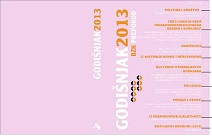Jedan manje poznat elaborat Vase Čubrilovića o rješavanju manjinskog problema u novoj Jugoslaviji od 3. novembra 1944.
A LESS KNOWN STUDY BY VASA ČUBRILOVIĆ ON MINORITIES ISSUE SOLUTION IN NEW YUGOSLAVIA ON 3RD NOVEMBER, 1944
Author(s): Šerbo RastoderSubject(s): History
Published by: Bošnjačka zajednica kulture "Preporod"
Keywords: minorities issues; Yugoslavia; Vasa Čubrilović
Summary/Abstract: Insufficiently known study on minority issues in Yugoslavia by professor Vasa Čubrilović, for the first time was published in form that was preserved in the Archives. The motives are multiple: they can be found in time when study appeared (3rd November, 1944), the contents of the text and the fact that the author was not only a professor at the University, but also a significant historical figure (participant of Sarajevo assassination) and the person who has already made similar studies for the Serbian Cultural Club needs (7th March, 1937). Shaping the ideas of “disloyal minorities” was not original and authentic but in fact, it produced effects that can be analyzed in last two centuries. From the standpoint of Serbian national idea, the problem can be viewed in the context of the fact that Serbia “lost” Kosovo in the south but “obtained” Vojvodina in the north. Certainly, this conclusion may arise from the analysis of the specific effects of the ideas realization outlined in the study, regardless the majority of authors who have studied it, claimed that partisan leadership did not accept Čubrilović’s study. However, the essence is that none of them did not dispute that Vojvodina was “cleaned of German ethnic minority.” An important motive for publishing the document consists in need of critical dividing the term “disloyal minorities”. Especially, it is important within the ideological- political context of the situation during the war on these areas. Because, the question is that if the current ideological- political scale-beam measures all, then you have come to the paradox that some people who were “majority” (eg. Serbs and Croats) with respect to the power of “Chetnik” and “Ustasha” movement and the qualifications of these movements in communist politics, should also, by the system of values presented in the study, be the object of attention? Certainly, the fact is that such possibility was not in a sight, it becomes clear that these ideas should not be seen as a consequence of ideological and political construction formed in the dawn of the current Communist victory, but as a continuity of national idea’s realization and projects existed in the nineteenth century.
Journal: Godišnjak Bošnjačke zajednice kulture »Preporod«
- Issue Year: 2013
- Issue No: 1
- Page Range: 384-410
- Page Count: 27
- Language: Bosnian

